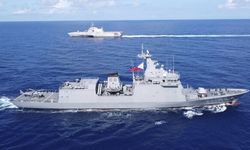The threat of China, particularly regarding a potential conflict over Taiwan, has brought these three countries closer together.
Chinese leader Xi Jinping has made it clear that he intends to bring Taiwan under Beijing's control, even using force if necessary.
The US is committed to defending Taiwan, and both Japan and the Philippines are US defense allies. They also face challenges from China in the South China Sea and the Senkaku Islands.
Analysts believe that if conflict were to arise, China couldn't ignore the Philippines and Japan due to their proximity to Taiwan.
Both Philippine President Ferdinand Marcos Jr. and Japanese Prime Minister Fumio Kishida emphasize the importance of peace in Taiwan for their countries' security.
The strategic significance of Taiwan extends to Japan's energy needs and maritime traffic in the South China Sea.
In an interview with CNN, Kishida emphasized the importance of the Philippines in maintaining a free and open Indo-Pacific region.
The Philippines and Japan also have separate disputes with China, particularly concerning territories like the Senkaku Islands and the South China Sea.
The Philippines has faced tensions with China over areas like Second Thomas Shoal, where Chinese ships have clashed with Philippine vessels.
Despite historical tensions, the Philippines sees alliances with Japan and the US as crucial for dealing with China's actions in the region.
Under President Rodrigo Duterte, there were doubts about US military access in the Philippines, but Marcos has strengthened ties with the US to counter Chinese influence.
The Biden administration is working on building alliances around China, including with Japan, South Korea, Australia, India, and Vietnam.
These alliances aim to provide stability in the Indo-Pacific region, especially with potential changes in US leadership.
Analysts describe this approach as "future-proofing," ensuring that alliances can withstand challenges, including those posed by a changing political landscape.







